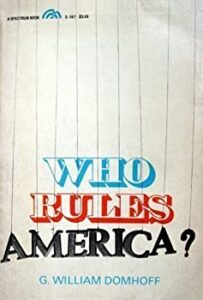One of my college textbooks back in the early 1970s was a book by G. William Domhoff, “Who Rules America?” He argued, as best I can remember, that a corporate elite wielded power through its influence over government as well its control of cultural institutions such as think tanks, foundations, academic departments. Apparently, Domhoff has updated his book several times over the years, but his fundamental thesis hasn’t changed.
It’s time for a fresh look at the question of who rules America. I would argue that America’s elites have fractured. A post-WWII corporate elite, based on wealth, still exists, but it has schismed. Some plutocrats remain relatively conservative on cultural issues, while others have embraced leftist nostrums. Moreover, there has arisen a cultural elite that is highly resentful of the power and privileges of the corporate elite. Members of the cultural elite aren’t mega-wealthy, but they are privileged and well-to-do, and they exercise enormous authority. They have captured the mainstream media, the universities, the foundations, the nonprofits, the museums and other cultural institutions, and through them, they frame the dominant narratives of our time.
The old corporate elite was motivated primarily by a desire to perpetuate its wealth. The new cultural elite is envious and would like to reappropriate much of that wealth for redistribution as it sees fit. Even more alarmingly, the cultural elite has a totalitarian instinct. Convinced of its righteousness, it is bent upon imposing its values and priorities upon the rest of the population.
The cultural elite might be described as America’s “intelligentsia.” In a recent column George Will delivers a devastating take-down.
Much of America’s intelligentsia has become a mob.
Seeking to impose on others the conformity is enforces in its ranks, articulate only in a boilerplate of ritualized cant, today’s lumpen intelligentsia consists of persons for whom a little learning is delightful. They consider themselves educated because they are credentialed, stamped with the approval of institutions of higher education that gave them three things: a smattering of historical information just sufficient to make the past seem depraved; a vocabulary of indignation about the failure of all previous historic actors, from Washington to Lincoln to Churchill, to match the virtues of the lumpen intelligentsia; and the belief that America’s grossest injustice is the insufficient obeisance accorded to this intelligentsia.
Its expansion tracks the expansion of colleges and universities — most have, effectively, open admissions — that have become intellectually monochrome purveyors of groupthink. Faculty are outnumbered by administrators, many of whom exist to administer uniformity concerning “sustainability,” “diversity,” “toxic masculinity” and the threat free speech poses to favored groups’ entitlements to serenity.
Today’s cancel culture — erasing history, ending careers — is inflicted by people experiencing an orgy of positive feelings about themselves as they negate others. …
Much education now spreads the disease that education should cure, the disease of repudiating, without understanding, the national principles that could pull the nation toward its noble aspirations. The result is barbarism, as [Jose Ortega y Gassett] defined it, “the absence of standards to which appeal can be made.” A barbarian is someone whose ideas are “nothing more than appetites in words,” someone exercising “the right not to be reasonable,” who “does not want to give reasons” but simply “to impose his opinions.”
I subscribe to Will’s view, and I embrace it as a framework for understanding the “deep” structure of power and politics here in Virginia. Bacon’s Rebellion will pay increasing attention to the question of “Who Rules Virginia” in reality, not in the mythology of the Left.


Leave a Reply
You must be logged in to post a comment.